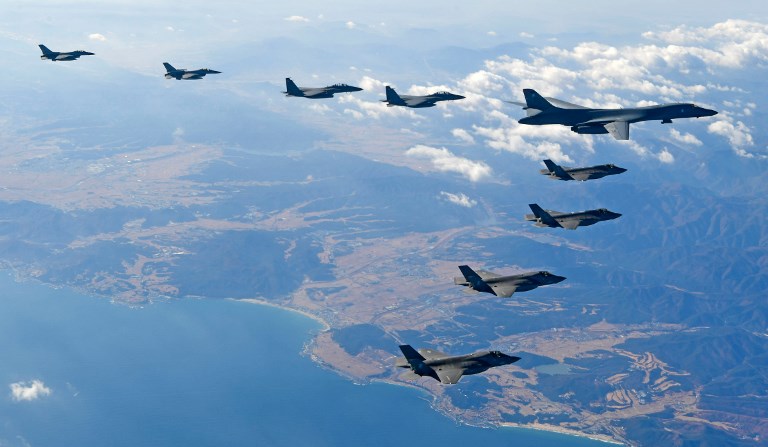
The five-day Vigilant Ace drill — involving some 230 aircraft including F-22 Raptor stealth jet fighters — began on December 4, five days after North Korea test-fired an intercontinental ballistic missile believed to be capable of hitting the US mainland in a new challenge to US President Donald Trump. / AFP PHOTO
WASHINGTON, United States (AFP) — The suspension of US-South Korean drills this summer hurt the readiness of the two militaries, the nominee to head US and UN forces in South Korea said Tuesday.
General Robert Abrams said the pause in drills, which President Donald Trump agreed to at his meeting with North Korean leader Kim Jong Un in June, had been a “prudent risk” to help facilitate a detente on the peninsula.
But there “was certainly a degradation in the readiness of the force, for the combined forces,” Abrams told the Senate Armed Services Committee at his confirmation hearing.
In June, after Trump met Kim in Singapore, the United States said it would suspend “select” exercises with South Korea, including the large-scale Ulchi Freedom Guardian exercises slated for August.
Defense Secretary Jim Mattis last month said the US would end its suspension of drills, though he later walked his comments back saying “no decisions” had been made.
Abrams went on to say that the continued suspension of the drills risked a further erosion in “readiness and capability and interoperability of the combined forces,” though he noted officials were working to minimize issues by running smaller scale staff exercises.
If confirmed, Abrams would fill the post currently occupied by General Vincent Brooks.
In military jargon, the role is “triple hatted,” meaning Abrams would head the United Nations Command, Combined Forces Command, and US Forces Korea.
When asked how he views North Korea currently, Abrams said Pyongyang had not changed its military posture but described a “general feeling of detente” on the peninsula.
“It’s been over 300 days since the last major provocation from the DPRK,” Abrams said, referring to North Korea by its official name.
“Since then, there’s been significant dialogue at multiple levels to include … communications between UN Command and the DPRK at senior officer level for the first time in 11 years.”
© Agence France-Presse







